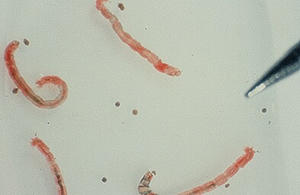Wildlife and landscape science research topics: sediment toxicology
| Article Title |
|---|
Sediment Toxicology |

Sediments can act as a sink for contaminants entering the aquatic ecosystem, or they may serve as a source of contamination. These toxins can accumulate in benthic organisms and alter the health of these organisms, act as an entry point for contaminants into the food web, and reduce the ecological integrity of the aquatic environment.
Physiochemical differences in sediment and the ecology of benthic organisms influence contaminant exposure and uptake. The multifaceted nature of sediment toxicity requires wildlife and landscape scientists to work with the larger Environment Canada community to develop a variety of approaches required to determine the dynamic characteristics of contaminated sediment, and the influence on resident biota.
Sediment toxicity testing uses standardized biological test methods to compare the response of benthic organisms to field collected sediments. Results are then compared to control samples and conclusions are drawn about the likelihood of given sediment producing measurable effects on biota.
Current applications of research topics include:
- Assessing ecotoxicological effects in field collected sediment, similar particulate waste (e.g., sludge, drilling mud, or dredged material), or sediment spiked experimentally with chemical(s), contaminated sediment, or particulate waste
- Differentiating the effects of historical contamination from current effluent quality
- Understanding how water chemistry in the receiving environment mitigates the bioavailability of chemicals in sediment

Experts in sediment toxicity
Further reading
- Biological Test Method Series: 21 standardized toxicity test methods publications for international laboratory use
- Canadian Sediment Quality Guidelines
- The Canadian Environmental Protection Act, 1999 public registry
- Managing Pollution, Environment Canada
- National Environmental Effects Monitoring Office, Environment Canada
- Environment Canada water research
- Environment Canada: Pollution and Waste
- Society of Environmental Toxicology and Chemistry (SETAC) Sediment Advisory Group (SEDAG)